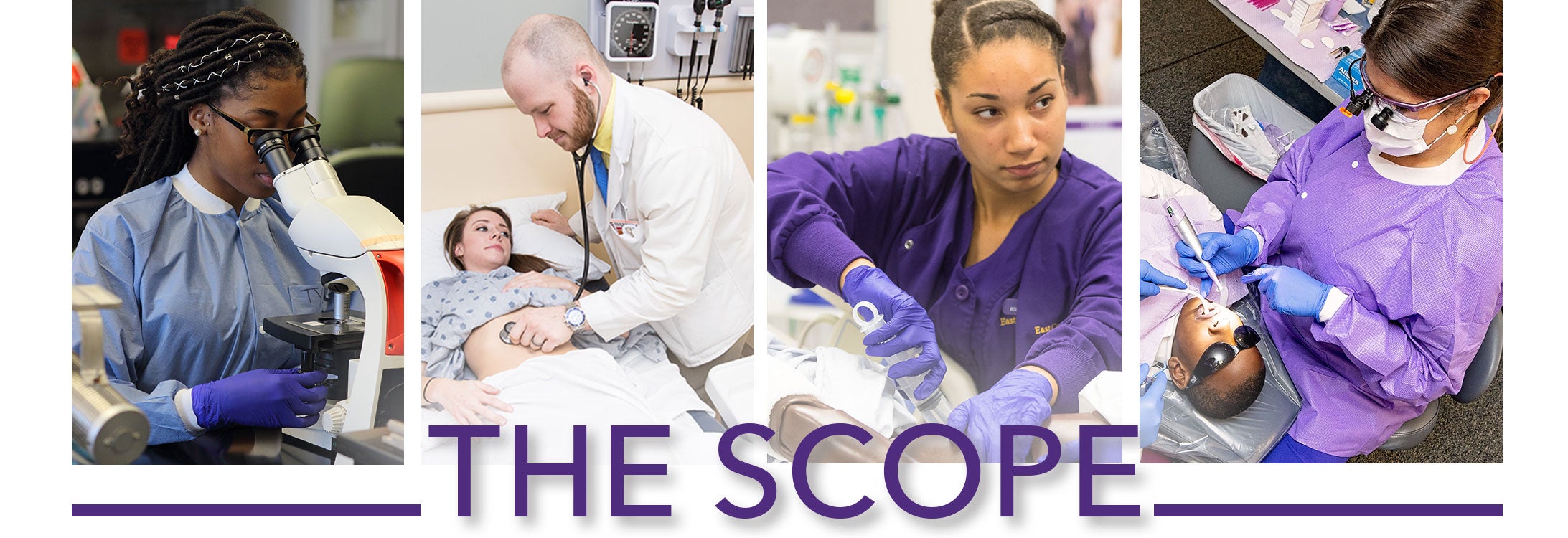February 2022
Welcome to the February issue of “The Scope,” the newsletter of the ECU Division of Health Sciences.
Greetings Colleagues,
Thank you for being great Pirates and for your commitment to our dual mission of education and health care in eastern North Carolina. Our laser focus on those two aspects with our teaching, as well as on research and our service, is admirable and does not go unrecognized by others. This is precisely why we see, for example, the opening of a new Life Sciences and Biotechnology Building on Main Campus and why the state has decided to invest in a new medical education building.
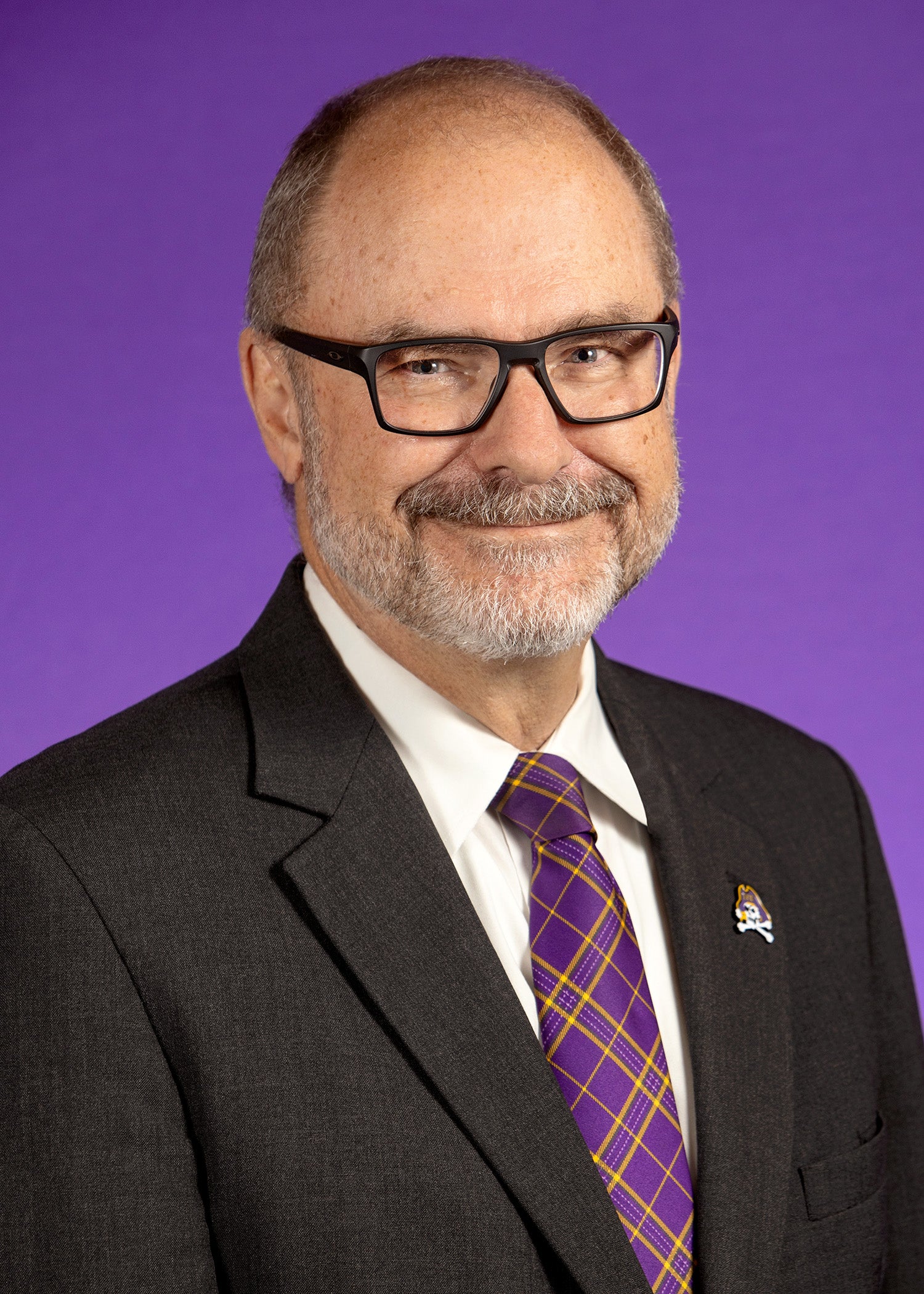
Dr. Ron Mitchelson, Interim Vice Chancellor, Division of Health Sciences
We have attended to our mission despite all the distractions endured over the past few years, including the pandemic, social unrest, leadership challenges and more. In my eyes, you are champions. Some of that is now in the rear-view mirror as we begin to look forward to some excitement. For example, planning for the new medical education building is just getting started and will commence with the selection of a design team. That Request for Proposal (RFP) is already out, and the selected team will guide us through programming and design. Programming will dictate appropriate design elements.
Another aspect that I look forward to is the acceptance by Chancellor Rogers of several recommendations from the Fiscal Sustainability Committee. One of those involves the academic reorganization of our campus to reflect a single Chief Academic Officer, the Provost. Over the next few months, a representative committee will write the proposal for this reorganization and will present it for consideration by the Faculty Senate. I am confident that this is a very good reform for our campus. You can’t have One ECU without a Chief Academic Officer. With this reform, we will be less siloed, more collaborative and nimbler in resource allocation. Administrative costs will be reduced.
I can’t wait for the new branding that will come with ECU Health later this spring. I keep telling Dean Waldrum that I want to see ECU Health in purple on those helicopters. The positive externality of having ECU purple across the current Vidant system is a key aspect of our new partnership. All of ECU (including enrollment) will benefit from this rebranding. I am grateful to Deans Waldrum and Higginson for helping us to bring ECU Health to fruition.
Let me close with a very loud THANK YOU to Dean Sylvia Brown, who will be retiring June 30, 2022. She is deserving of our admiration, our gratitude and our recognition. Forty-six years of service to ECU, 16 years as dean and a college that we can all be proud of. Knowing Sylvia, she will deflect the praise upon her team, but she has truly been a great ECU leader. She deserves recognition, and if you’d like to contribute to a scholarship fund in Sylvia’s name, please contact Elizabeth Maxwell (maxwellg17@ecu.edu) and she will be glad to assist.
All right Pirates, the spring semester is shaping up to be a great one, and I’m glad that you are part of it.
Regards,
RonM
Interim Vice Chancellor,
Division of Health Sciences
Education
The division has continued providing quality classroom instruction, dynamic clinical experiences and unique learning opportunities for its students.
The College of Nursing welcomed new students during its traditional Lamp of Learning ceremony on Jan. 27. The college’s 119 new traditional Bachelor of Science in Nursing students joined 23 accelerated second-degree BSN (ABSN) students in learning about the history of the college and the profession. Each student received a golden lamp pin to wear on their scrubs. The symbol is a nod to the founder of modern nursing, Florence Nightingale, and signifies service and light.
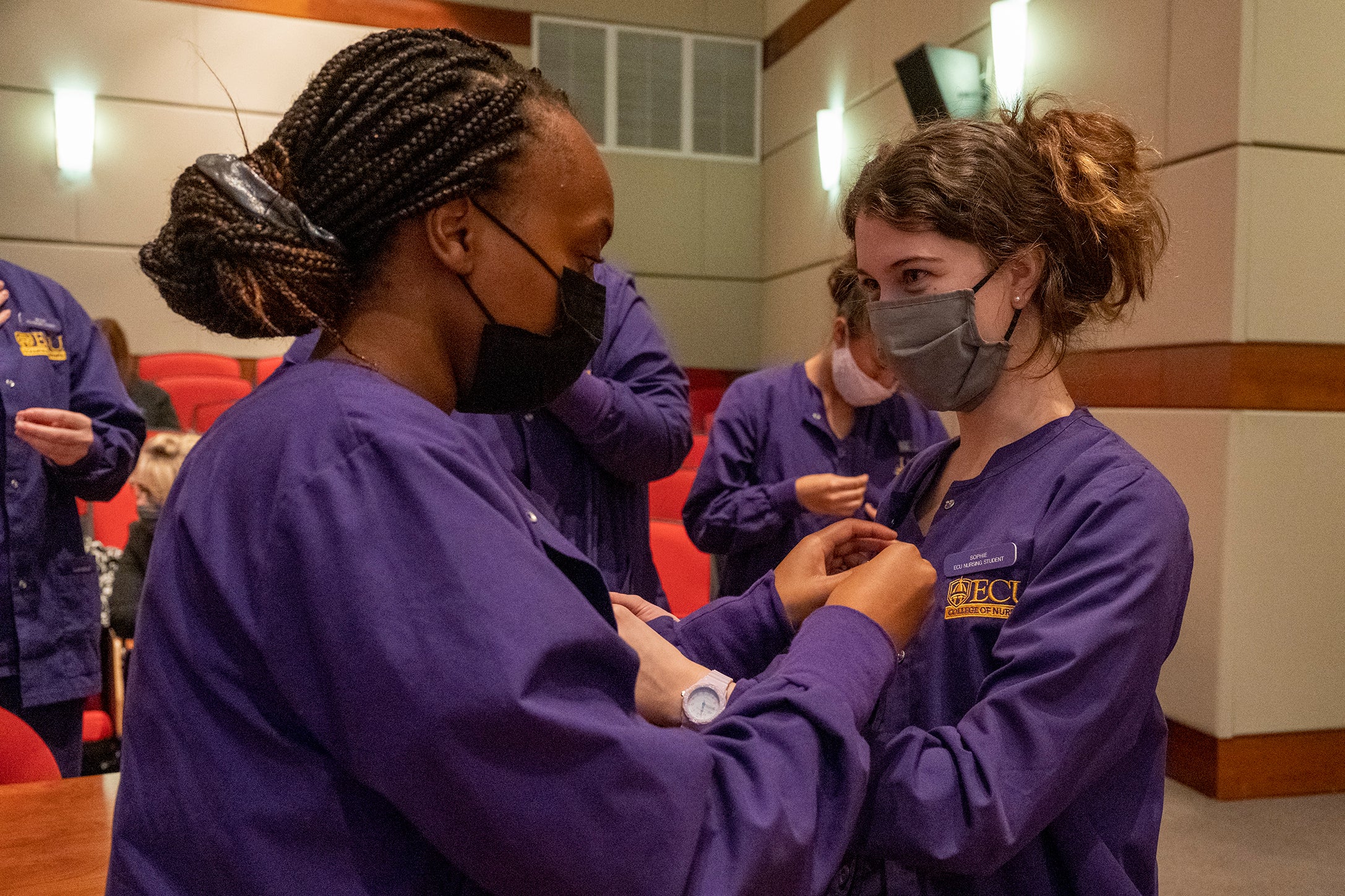
Nursing students Priscilla Gichaca, left, and Sophie Giddings, pin each other with golden lamp pins. (Photo by Jeremy Smith, ECU College of Nursing)
“Ethics is extremely important and for the public to recognize that, I think, is a high accolade for our profession,” College of Nursing Dean Sylvia Brown said. “During this pandemic, it’s pointed out more the importance of nursing, our profession and what we’re doing worldwide to help fight this pandemic.”
The College of Nursing also recently honored its 2021 Preceptors of the Year, which included 17 individuals serving in state and national health care organizations. Although College of Nursing faculty oversee many of the student clinical experiences, preceptors provide students with additional one-on-one attention.
Students in the Brody School of Medicine organized a virtual information session and discussion about bone marrow donation and the need for diversity in signing up for the registry through Be the Match. The event was coordinated by the Brody chapters of I Am First, Student National Medical Association and Latino Medical Student Association, and sponsored by Dr. Chris Heery, Brody School of Medicine alumnus and oncologist.
“As medical students, we spend the first two years primarily in a classroom learning foundational science and details about almost every human disease and disorder,” said student organizer Jennifer McMains. “Medical students, as a group, but especially those at Brody, have a deeply rooted passion for helping the underserved. Although we are not yet interacting with patients in the clinic on a daily basis, we can still have a role in their care through advocacy.”
School of Dental Medicine Assistant Dean for Dental Education and Informatics Robert Todd Watkins, Jr. was elected to the National Academy of Inventors Senior Members Class of 2022. The organization announced the newly inducted members on Feb.11 — National Inventors Day. Watkins is the third from ECU to receive this honor since 2010. He joins a class of 83 academic inventors across 41 research universities and institutions. A long-standing innovator and entrepreneur, Watkins has received four U.S. patents since December 2020.
Watkins saw the need to make curriculum available in a digital format, leading to his first startup company, Vital Source Technologies, Inc., which would become a global leader in digital content. Starting in 2008 at ECU, Watkins translated his research on assessment technologies into an outcomes assessment engine called eXtensible Competencies Platform (XComP™) which he implemented with the first class of ECU dental students. The system gained worldwide attention and recognition from Apple when the ECU School of Dental Medicine was repeatedly selected as an Apple Distinguished School. Watkins became a member of the Apple global community of educators who use technology to benefit student learning. XComP™ eventually garnered attention and a partnership with IBM in 2018, and the platform is expected to become commercially available this year.
“This award is personally satisfying and is also a credit to ECU’s real commitment to developing public/private partnerships from translational faculty research,” Watkins said.
Patient Care
Providers, faculty and students found innovative ways to serve communities through expertise and compassion.
The Pitt County Care Clinic, led by Brody School of Medicine students, continues to offer care to uninsured patients through efforts between physicians at Brody, Vidant Health, Pitt County Health Department and other organizations committed to community and public health. The clinic offers patients care on Sunday afternoons at the health department.
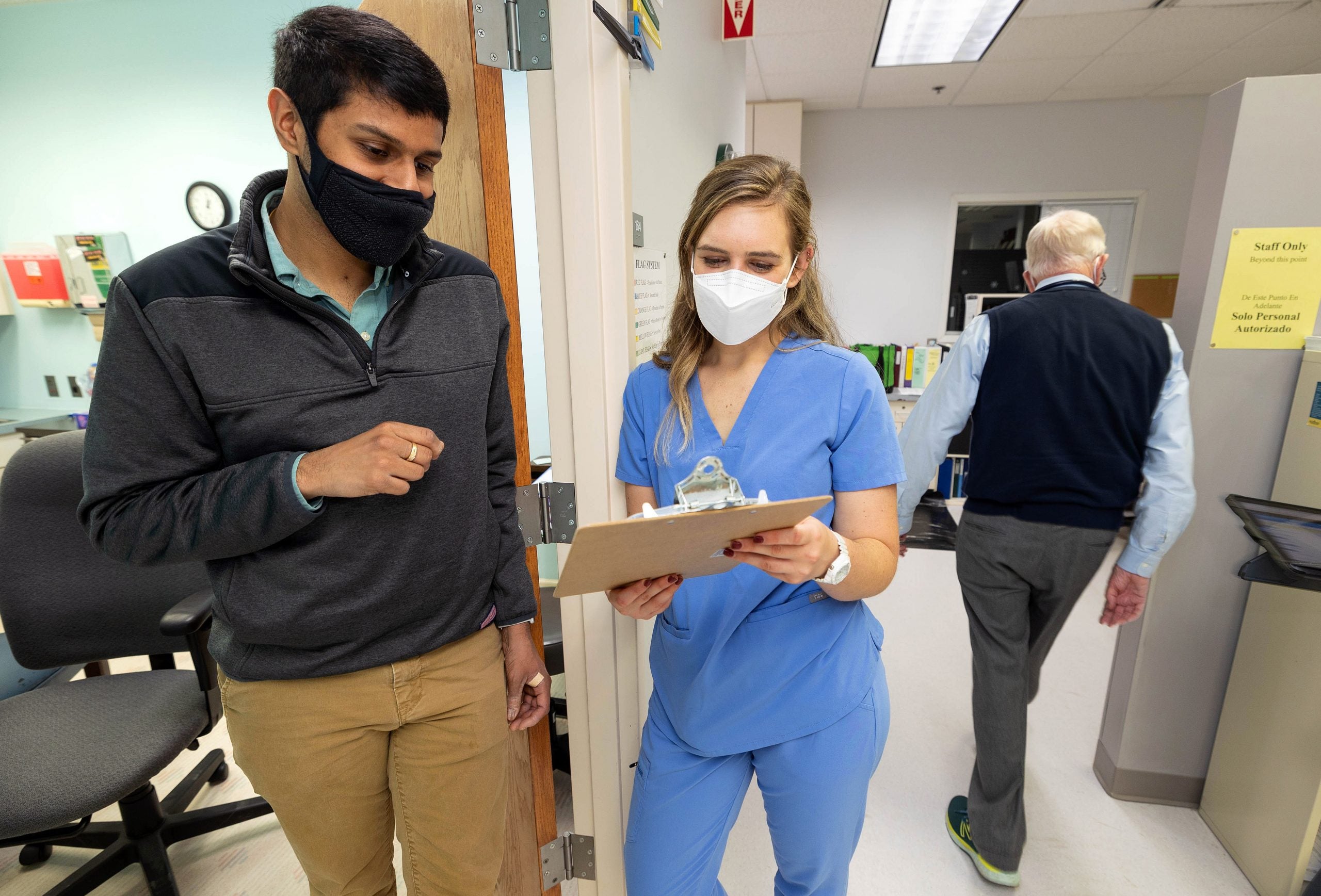
Bridget Gallagher, right, co-director of the Pitt County Care Clinic and current Brody School of Medicine student, works with clinic staff to provide care on Sunday afternoons to uninsured patients in the community. (Photo by Rhett Butler)
On-site evaluations include blood pressure screenings, vital signs, history, physical examinations, blood glucose, cholesterol and urinalysis. A limited amount of medication is available for supplementing the patient’s previously prescribed regimens.
“In medical school, you don’t exactly have an abundance of time to get to know people outside of the Brody bubble,” said Bridget Gallagher, second-year medical student and outgoing clinic co-director. “I knew that the Pitt County Care Clinic would be a way to sustainably serve members of our community under the guidance of mentors who have a better understanding of the area’s history and needs.”
One of those mentors is Dr. Tom Irons, who has served as president of the PCCC for 23 years and credits those who make the clinic a success each week.
“I still marvel at the generosity of the good people who show up Sunday after Sunday,” he said. “It’s a wonderful demonstration of how much can be accomplished when people set aside institutional differences and come together in service.
Gallagher’s medical school journey was chronicled recently on ECU’s website through the Pirate Profiles series. The emphasis on underserved patients was one deciding factor that made Gallagher ultimately choose Brody for her medical education.
“I chose Brody because I wanted to learn from and alongside people who cared about service in medicine and were willing to take the time and energy to think critically about their community’s needs,” she said. “As medical students, we are constantly reminded that choosing to be a doctor is choosing to be a lifelong learner. The context usually applies to the growing pool of clinical knowledge and hard facts, but I think it also applies to learning from the experiences and perspectives of those we interact with daily, professors and patients alike.”
A study from a team of researchers from Brody’s Department of Public Health, along with public health master’s students and collaborators from UNC-Chapel Hill, University of Kentucky and Research Triangle Institute explores the advantages and disadvantages of online grocery shopping for WIC participants and hints at how the method used to shop for groceries could impact the types of foods purchased.
The study results revealed that participants made impulse purchases in-store that included chips and candy, and sometimes healthier foods such as fruit. Participants found that advantages of online grocery shopping included ease, convenience and saving time. Disadvantages included inadequate substitutions, the online shopping fee, lack of control over selection of perishable goods and inability to find good deals online versus in the store.
“Designing and implementing a healthy eating intervention for WIC participants was the goal of the research,” said public heath professor and researcher Dr. Stephanie Jilcott Pitts. “There are many public health nutrition researchers working on this type of intervention, and it will be interesting to see if shopping online can help people make healthier choices.”
Compassionate care also includes serving patients through advocacy in local and state arenas.
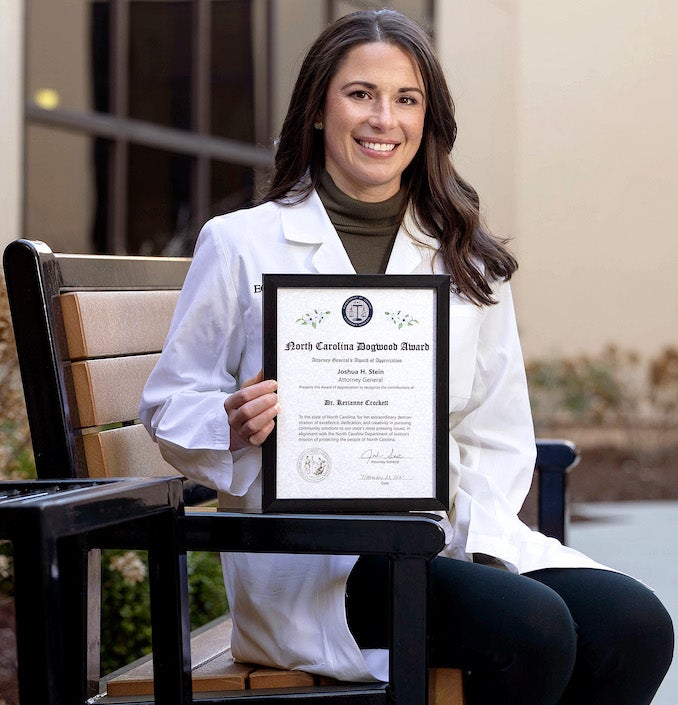
Dr. Kerianne Crockett received the Attorney General’s Dogwood Award for her advocacy for the rights of incarcerated pregnant and postpartum women. (Photo by Rhett Butler)
Dr. Kerianne Crockett, a faculty member and obstetrician with Brody and Vidant Health, has been honored for her efforts to pass legislation that, among other points, limits the use of shackles during labor and delivery for incarcerated women.
Crockett was one of 36 recipients of the 2021 Attorney General’s Dogwood Award. N.C. Attorney General Josh Stein announced the winners of the annual award that honors North Carolinians who work to keep people safe, healthy and happy in their communities. Crockett pushed for legislation — House Bill 608, which became law last fall.
“Like many of my friends and colleagues, my tendency toward compassion and capacity for empathy are the reasons I chose medicine,” Crockett said. “Being in such close proximity to the legislative process was interesting and inspiring in some ways, frustrating in others. Overall, the whole thing has been pretty life-altering.”
The Dogwood Award honors Crockett’s efforts and her professional characteristics that also align with the missions of ECU and Vidant.
“The Brody School of Medicine teaches compassion, and Vidant Health is committed to providing compassionate care. This award honors not only Dr. Crockett’s tireless work to improve the human experience, but also the invaluable intersection of health care and empathy,” said Dr. Michael Waldrum, dean of the Brody School of Medicine and CEO of Vidant Health.
The experience that led Crockett into advocacy changed her life and the way she looks at her career.
“Like I alluded to before, compassion and empathy have always come naturally to me, but, before this, I didn’t really regard them as the strengths I now know they are,” she said. “I felt like I needed to ‘prove’ myself as a physician in other ways. I now know that they are just as important as intelligence, work ethic, technical skill or whatever other capability you might hope your doctor possesses.”
Crockett also hopes that her experience advocating to legislation from bill to law inspires medical students, residents and citizens to act when they see a need for change. She also hopes it instills in future physicians a penchant for advocacy.
“Residents and students who have worked with me over the last several years have heard me say this a million times and will probably roll their eyes: doctors engage in civic processes, even voting, at a much lower rate than peers in other professions. The reasons are multifactorial, but the result is laws and policies that impact our profession and our patients but that have been crafted without our input,” she said. “If this story inspires medical students, residents, other health care professionals, or really anyone in our community to get involved with an issue that has been nagging at them, then that is just wonderful.”
Research
The division’s vibrant research enterprise was celebrated during research-focused events and through real-world applications that are changing lives.
ECU’s College of Allied Health Sciences’ Pediatric Assessment and Rehabilitation Lab (PeARL) in the Department of Physical Therapy recently hosted a dozen children and teens with hemiplegic cerebral palsy, ages 6-16, for an intensive therapy research study in a camp-like setting.

Will Cox, 15, plays a game of catch as part of an intensive therapy study at ECU’s College of Allied Health Sciences.
The Hand Arm Bimanual Intensive Therapy (HABIT) study is funded through an Academy of Pediatric Physical Therapy grant to the principal investigator Dr. Swati Surkar and aims to determine if remote ischemic conditioning — essentially altering blood flow to the affected arm using a blood pressure cuff — combined with the repeated practice of bimanual (two-handed) games and activities can enhance the bimanual skill learning and brain function of children with hemiplegic cerebral palsy.
“The beauty of this study is kids typically get 30-45 minutes of physical therapy twice a week, but it has been shown in research that intensive therapy — for example, 7-8 hours a day for 1-2 weeks — works better both in improvement of hand skills and in brain function,” said Surkar, an assistant professor in the Department of Physical Therapy. “The goal here is to deliver that kind of intensive therapy, but that can be exhausting, so we are doing it in a more playful and camp-like atmosphere.”
Choruses of encouragement from the faculty and student volunteers were only upstaged by the thunderous ovations that echoed whenever one of the study participants accomplished a goal.
“The 9-year-old boy I am working with loves sports, so we’ve played a lot of basketball. We asked him to dribble with his left hand, but he said, ‘I can’t do that!’ But we encouraged him to try, and he was eventually able to do it, so he was really excited, and we were all really excited,” said Mary Scott Faircloth, a second-year doctoral student. “I feel like I’ve learned so much, these kids are all so wonderful. It’s been really cool to see them already seeing a difference in just a few days.”
The School of Dental Medicine hosted its annual Celebration of Research and Scholarship (CORAS), during which dental students along with others from across the division and the College of Engineering and Technology showcased their research. The event culminated with an awards ceremony and a keynote address from North Carolina native Dr. Amy Martin, professor and chair in the Department of Stomatology in the College of Dental Medicine at the Medical University of South Carolina.
“Having an opportunity like CORAS to share our research is wonderful because we get to showcase collaboration, creativity and critical thinking,” said third-year dental student Cody Phen. “Not only do we get to share what we researched, but we also get to learn all the new concepts and exciting ideas being explored within the dental school. CORAS is an event where research that is showcased can be translated to real-life clinical applications that can in turn have significant results in patients.”
Visit this video on YouTube for the closed-captioned version.
DHS Spotlight
In the spirit of excellence in education and a collaborative campus, we will be highlighting a variety of students, staff and faculty who represent the colleges and schools in the Division of Health Sciences.
This month, we meet Darian Askew, a fourth-year student in the School of Dental Medicine.

Fourth-year dental student Darian Askew practices skills while in clinic. Askew hopes to practice in a rural community similar to his Hertford County hometown.
Although Darian Askew has worn out the beaten paths between Greenville and Ahoskie, the roads in both directions lead home.
Askew, a fourth-year dental student in the East Carolina University School of Dental Medicine, grew up in Union, a small community in Hertford County that lies a stone’s throw from the dental school’s community service learning center(CSLC) in Ahoskie. The first-generation college student and future pediatric dentist wants to create hope from his experience.
“It was great because everyone who came in would say, ‘Oh hey, it’s you!’” Askew said of community members during his rotation at the CSLC-Ahoskie. “I wanted people to come in and see me and think, ‘If he can do this, I can do this.’ If I can change one kid’s trajectory, then it’s worth it.”
After graduation in May, Askew will complete an advanced education in general dentistry residency at the CSLC-Ahoskie, where he hopes to one day open a pediatric dental clinic. He plans to apply for a residency in pediatric dentistry, with hopes of returning to ECU’s dental school. He is keeping his options open on where to practice, as long as he lands in a rural community where he is needed.
Askew graduated from ECU in 2016 with a degree in molecular biology and returned home to teach. He had a nagging feeling, though, that another career was calling him.
“It was more about being able to do something that the people in the community could be proud of,” he said.
Classmate and friend Eugene Adei said Askew applies the same care, attention to detail and compassion to everything he does.
“Darian is an absolute professional with a profound interest in providing dental care to the underserved communities in North Carolina,” Adei said.
Askew credits the dental school with teaching him how to interact with people from different backgrounds, cultures and places.
“I don’t believe I would be exposed to the same level of cultural variation at a school localized to one area,” he said. “Being able to relate, empathize and interact with people on almost any level, I believe is a great trait to have, and probably my greatest strength now.”
Philanthropy
Across ECU’s Main Campus and Health Sciences Campus, colleges and schools are gearing up for Pirate Nation Gives, the university’s major one-day giving campaign, slated for Wednesday, March 23. ECU supporters in North Carolina and around the world will have 24 hours to honor the university’s impact on them through giving.
Pirate Nation Gives focuses on the collective power of giving back to make ECU an amazing place to be.
Last year, ECU’s fifth annual Pirate Nation Gives set records for number of donors and amount raised.
The one-day, social media-driven campaign raised more than $6.5 million for the university, surpassing its goal of $3.2 million. It also met its goal of 1,200 unique donors in honor of ECU’s 12th chancellor, Dr. Philip Rogers. Last year’s event had 432 donors, making this year’s participation a 179% increase.
“It’s truly inspiring to see so many Pirates come together to be part of this day of giving,” Rogers said. “This success shows how small actions made by many people can have a huge impact. Thank you, Pirates!”
For more information on how you can participate in Pirate Nation Gives and support colleges, schools, scholarships, programs and initiatives, visit the Pirate Nation Gives website.
Learn more about how you can support the mission of ECU’s Division of Health Sciences through the ECU Medical & Health Sciences Foundation, Inc.
